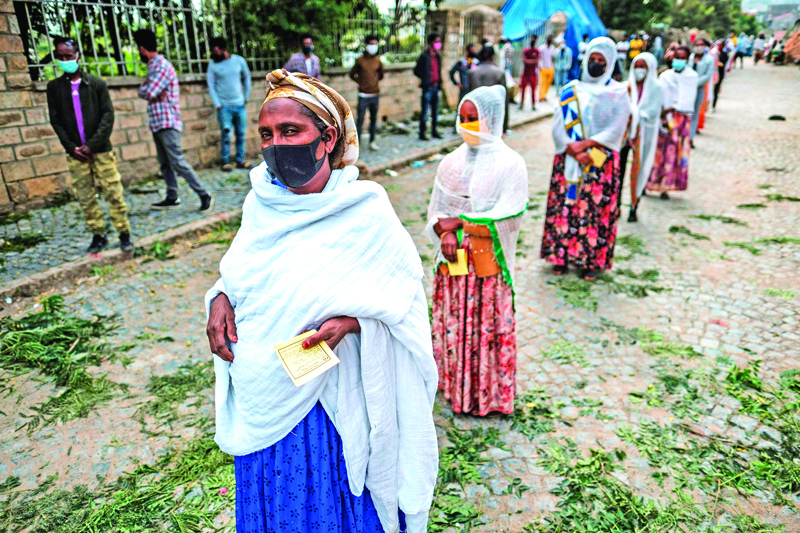
MEKELE: Ageing war veterans and university students joined long pre-dawn lines in Ethiopia's northern Tigray region to vote yesterday in parliamentary elections that Prime Minister Abiy Ahmed's government has deemed illegal. Polls opened at 6am across the mountainous northern Tigray region despite a federal decision to postpone all elections because of the coronavirus pandemic.
The election represents the latest challenge to Abiy's authority as he navigates a democratic transition hobbled by deep political and ethnic divisions, and a low point in the bitter dispute between the federal government in Addis Ababa and Tigray. The region sharing a border with Eritrea and Sudan dominated Ethiopian politics for nearly three decades before anti-government protests swept Abiy to power in 2018.
Ethiopia was supposed to hold national elections in August, but the national poll body announced in March they would need to be postponed because of the pandemic. Tigrayan leaders rejected the extension of mandates - which would have expired in October - contending Abiy will have no legitimacy after that. Their decision to unilaterally hold their own elections has clearly rankled federal officials, who have said they have "no legal basis" and are "null and void".
In the regional capital Mekele, some voters struck a defiant note as they waited to cast ballots. "We want the federal government to take a lesson from this: They need to hold elections, too, so we can work together to build the country," said Hailay Haileselassie, a 37-year-old who works for a construction company. More than 600 candidates from five parties are vying for 152 regional parliamentary seats, and the parties will decide how to allocate the remaining 38 seats at a later date, said election commissioner Muluwork Kidanemariam.
The heavy favourite is the Tigray People's Liberation Front (TPLF), which led the armed struggle to topple the brutal Derg regime in 1991 and went on to control the ruling coalition that took over. Though the TPLF has been sidelined under Abiy, it remains in command in Tigray, which makes up six percent of Ethiopia's population of 110 million. Hailu Kiros, 62, was one of many wheelchair-bound TPLF veterans who cast votes yesterday morning. "This is important for me. We fought for this, so that elections could be held every five years," he said.
'Shanty election'
The TPLF is facing off against four other parties, one of which - the Tigray Independence Party - is calling for Tigray to secede and form its own country. The campaign featured televised debates among party leaders, and opposition politicians say they have had good access to regional media. Yet some opposition politicians have been harassed and briefly detained by security forces in recent days and pressured into dropping out, said Hayalu Godefay, chairman of opposition party Salsay Woyane Tigray. "When the election got closer, the stance of the TPLF changed toward the opposition. I think they didn't expect such support for the opposition from the people," Hayalu said.
It remains unclear whether Tigray will face federal retaliation for going ahead with the vote. Abiy, winner of last year's Nobel Peace Prize, has previous ruled out a military intervention or budget cuts. In an interview with state media Tuesday night, he resorted to metaphor to issue a vague threat. "The election that will be held in Tigray is a shanty election. And when you build a shanty, some days the local officials will see you, some days they won't," he said. "But because those who construct a shanty don't have land deeds and are illegal dwellers, they don't sleep with their eyes closed."- AFP









